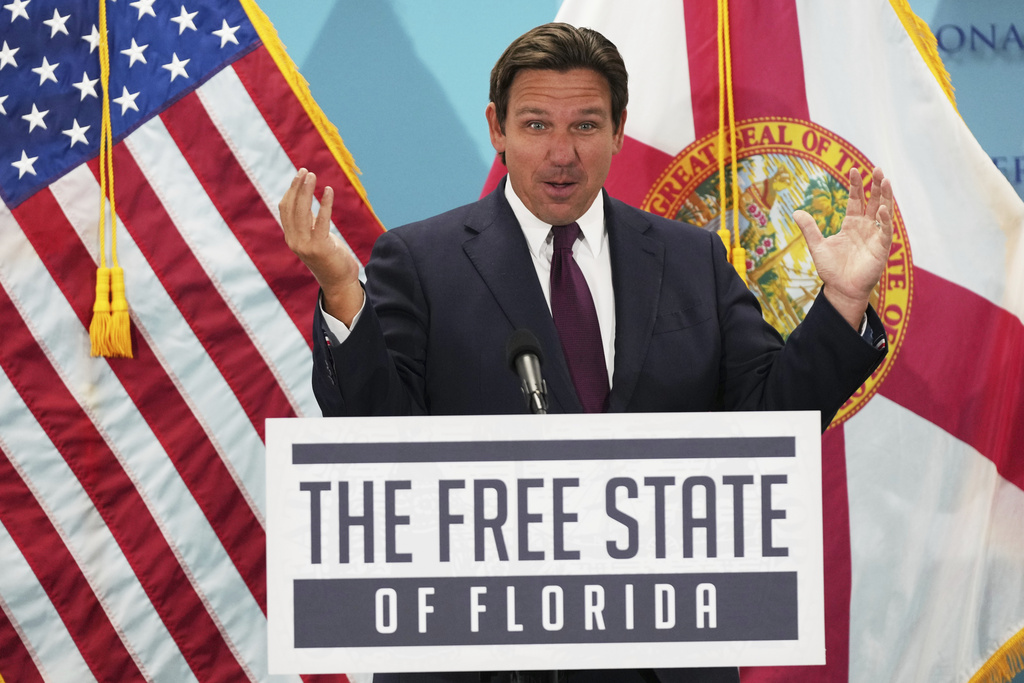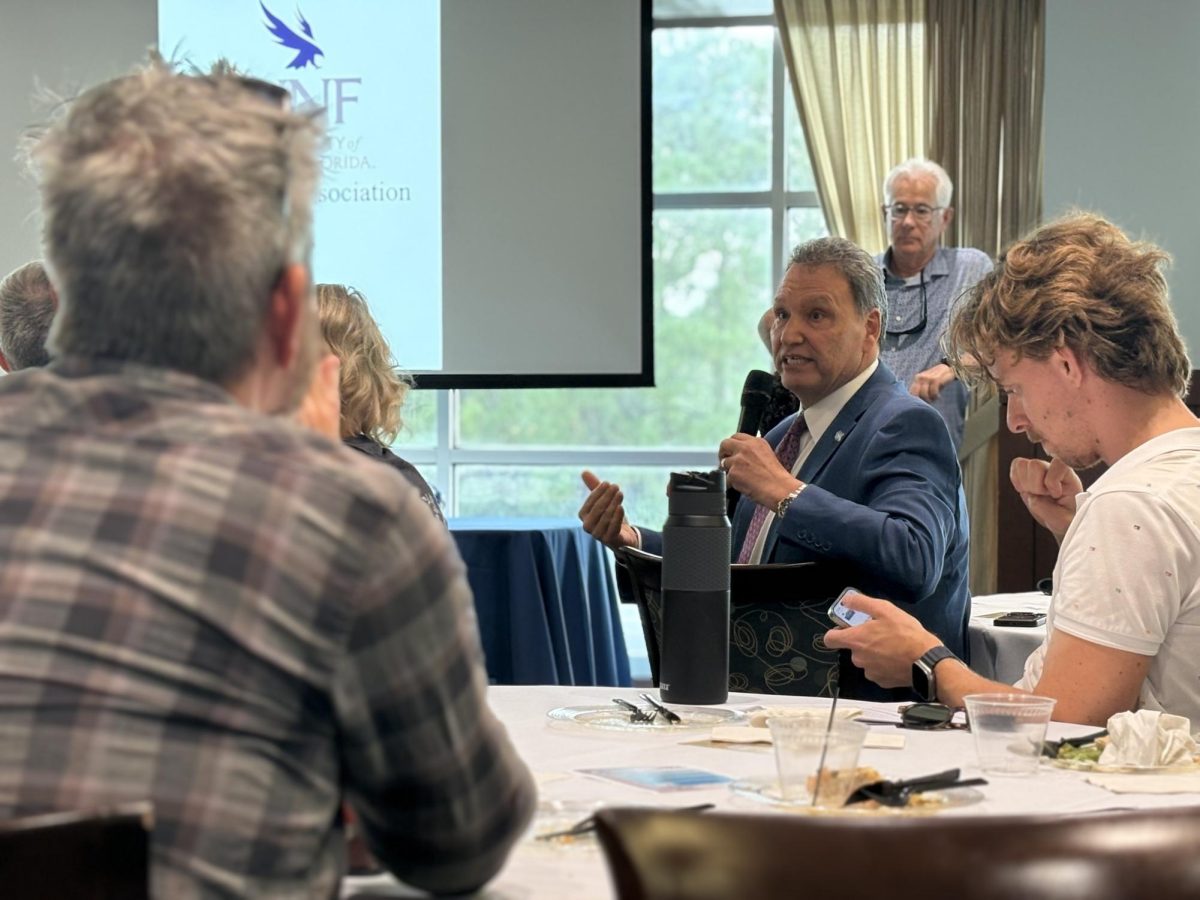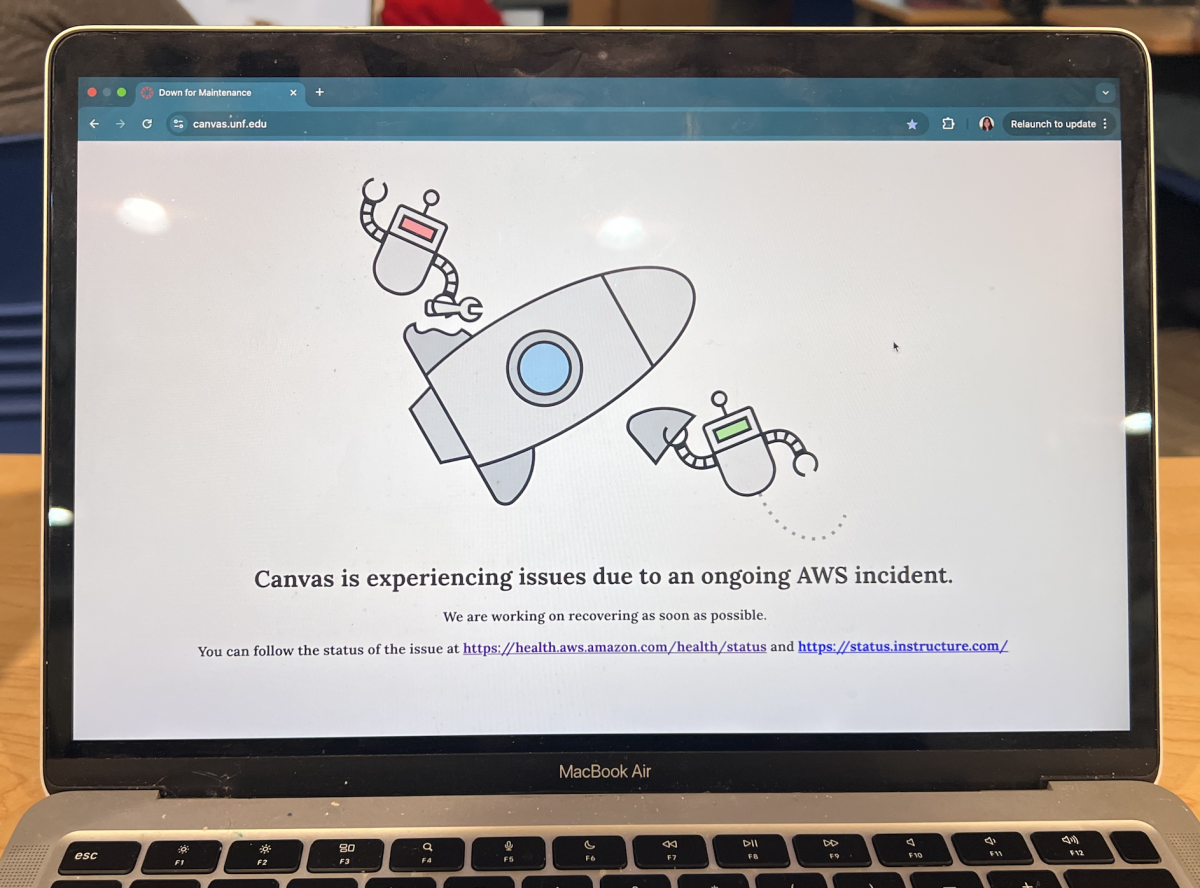Last month, the office of Florida Gov. Ron DeSantis sent a letter ordering Florida’s public universities to submit a slew of institutional records for grants, faculty research and staff positions.
These information requests are part of the state’s new Department of Government Efficiency initiatives. In its first communication to universities, Florida DOGE said the requested information will be used to evaluate “unnecessary programs, courses, staff and any other inefficiencies” at each school. By April 30, UNF submitted all of the requested information to the governor’s office.
Most requests asked for institutional data collected over the past six years, including but not limited to, all awarded grants, all faculty-published research and every non-instructional job position since 2019. Documents show that UNF did not fulfill every information request in its entirety due to data constraints or the request’s lack of specificity.
The senior advisor to UNF President Moez Limayem, Lorraine Beach, is the university’s point of contact for the Florida DOGE requests. Along with each information submission, documents show that Beach provided a “transmittal memo,” which explains how files are organized and why documents—if any—were not provided.
According to a UNF spokesperson, university representatives who were in contact with the governor’s office were never given more information on how the data will be used. In response to questions about the information requests, Florida DOGE only clarified wording and formatting, according to documents.
Spinnaker reached out to the governor’s office on May 7 for a statement on how this data will be used and what types of recommendations will come from Florida DOGE’s evaluations, and has yet to receive a response.
For now, here’s a breakdown of everything UNF submitted to Florida DOGE.
Request 1: Grant applications, award notices and agreements
Florida DOGE’s first information request was information for the past six years of grants awarded to the university, including:
- Grant application
- Notice of award
- Grant agreement
The university provided six folders for each fiscal year of contracts and grants awarded, but in her memo to the state, Beach wrote that UNF could not completely fulfill this request because some contracts and agreements are not part of public record.
“UNF would violate expectations or contractual obligations of confidentiality if we were to provide applications, agreements, and contracts, especially without an understanding of how such documents will be shared and used,” Beach wrote, citing Florida DOGE’s potential use of artificial intelligence in its evaluations.
Additionally, UNF did not submit some award notice documents because, as Beach explained in her memo, they would not be considered part of the public domain.
“The majority of UNF’s contract/grant work is either with well-established partners… or fall under master agreements where there is no formal award process—the contract is the award notice,” Beach explained in her memo.
Aside from any submissions that would violate confidentiality agreements, the university submitted financial and researcher information for over 350 grants awarded to UNF over the past six years.
Request 2: All Research Published by University Staff
Next on the request list from Florida DOGE was a collection of the past six years of published research by university staff, according to the state’s original request.
But according to Beach’s memo response to Request 2, Florida DOGE further clarified what it was asking for in responses to other universities’ questions. According to the memo, universities were required to provide:
- All Papers, publications, books, invited papers, abstracts, and any other published item by staff employed at the institution.
- The staff who authored or worked on the publication, whether currently still employed at the institution or not.
- Should an individual be employed less than six years at the institution, their published works while employed at the institution
- Any available prior published works that are available
Rather than submitting files for each publication, UNF provided identifying information for each publication in a spreadsheet. According to Beach’s memo, this is because the university does not have a license to faculty publications per its agreement with the UNF faculty union.
Request 3: All Non-instructional Employee Positions
Florida DOGE also requested the following information for all non-instructional positions for the past six years, whether the position was filled or vacant:
- Position title
- Position number
- Position classification
- Position salary
- Position description
UNF provided all of this information in spreadsheets, and Beach did not include any content exceptions or notes in her memo.
Request 4: Indirect Cost Recovery Policies for Grants
For its fourth information request, Florida DOGE asked universities to submit their “policy regarding allocation of grants for purposes of indirect cost recovery, including procedures for calculation,” according to government communication.
UNF completely fulfilled Request 4 by providing its Research and Sponsored Programs regulation along with other indirect cost procedures and rate documents, according to the memo.
What is indirect cost recovery?
For grants, indirect costs or Facilities and Administrative (F&A) costs are what keep the lights on while research activities take place. F&A costs are not related to project objectives, but rather overhead expenses like rent, utilities and accounting, according to the Grant Professionals Association.
Indirect cost recovery (ICR) is how universities like UNF support its facilities and future projects. ICR is determined by a rate negotiated every few years between UNF and the government office that handles rates for Florida universities, according to UNF policy. This rate is then applied to all federally-funded projects so UNF can be reimbursed for the indirect costs.
Request 5: Grant Descriptions and Assigned Staff
For each grant submitted for Request 1, Florida DOGE asked universities to submit the following:
- A description of the grant’s purpose in 100 words or less
- Position numbers and names of staff assigned to administer the grant, excluding students.
UNF fulfilled this request completely and provided the information in six spreadsheets—one for each fiscal year. For descriptions of each grant’s purpose, UNF provided each project’s abstract.
Request 6: More on University Staff’s Published Research
To add to Request 2 for the past six years of staff-published research, Florida DOGE asked universities to submit the following for each publication:
- Length of research associated with the publication
- Any funding associated with the research, including funding source
- Abstract of the research
- Any associated articles and publications about the research made by the researcher or the institution
According to Beach’s memo for Request 6, UNF provided funding information and abstracts for the research whenever it was available. Any included funding information was identified by the staff who worked on the research, and some abstracts weren’t reported because they were blocked by academic journal paywalls, according to the memo.
The memo also explained how the length of time for each research publication was calculated.
Request 7: More on Non-instructional University Positions
In addition to the list of non-instructional staff roles for Request 3, Florida DOGE asked for the following for each position:
- The position funding source
- If the position is on a tenure-track
- If the position is in-person, remote, or hybrid
- If multiple individuals fill the same position, provide the associated details and justification
Information on positions filled by multiple people, or whether the positions were in-person, remote or hybrid, were the only pieces of Request 7 UNF did not fulfill, according to Beach’s memo.
For positions filled by multiple people, Beach wrote in her memo, “based upon the parameters of the request, UNF does not have any positions filled by multiple individuals.”
When it came to providing whether a position was in-person, remote or hybrid, UNF had no data to submit, according to the memo. Beach explained that UNF doesn’t have any positions designated as “remote” or “hybrid,” and therefore has nothing to submit.
But there are remote and hybrid UNF employees, right?
UNF does have faculty and staff who work remotely and hybridly, but according to the memo, these are arrangements employees make with their supervisors after being hired. This means that every position at UNF would start out as “in-person,” which is why technically, there are no “remote” or “hybrid” positions.
Request 8: Staff With Both Instructional and Non-instructional Roles
The last Florida DOGE request to universities was for a list of all employees who hold an instructional and non-instructional role at the same time.
According to the memo, UNF fulfilled this request entirely.
How could an employee hold an instructional and non-instructional role at the same time?
Usually, “faculty” refers to university professors and researchers, while “staff” refers to employees in administrative or support roles. For Request 3 and Request 8, Florida DOGE asked for all the employees at UNF who classify as both faculty and staff.
According to the submitted documents, UNF currently has 30 employees who classify as both faculty and staff—but how?
At UNF, it’s common for an active professor to double as a department chair. For example, the Department of Mathematics and Statistics chair also works as a professor, holding both an instructional and non-instructional position. Another common instance of dual faculty-staff is when administrators also work as adjunct professors.
___
For more information or news tips, or if you see an error in this story or have any compliments or concerns, contact editor@unfspinnaker.com.
















